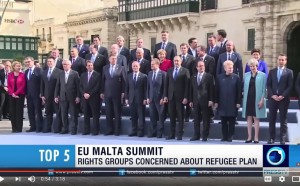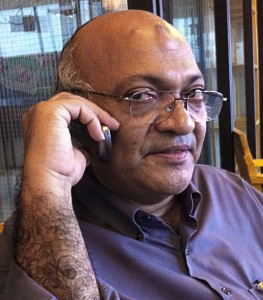Archive for the ‘Pro-peace & proposals’ Category
The Trump Presidency: The first week
By Johan Galtung
Attacking the Affordable Care Act; the “global gag rule” against abortion; the federal regulation and hiring freeze; canceling the TPP; restarting the Keystone XL and Dakota Access Pipeline; limiting entry with the Mexican Wall; the 90-day travel ban on seven countries; more undocumented people prioritized for deportation; no federal funding for cities refusing to cooperate; communications blackout from federal agencies; Guantánamo torture continued:
What does it add up to?
A very strong white state centered on a president with absolute power and control over life (birth) and death (care) of the citizens. Not regulating police racism. So far, no order on the military.
Fascism? Too early to say; but in that direction. It opens for questions about the inner workings of Donald J. Trump. Who is he?
A Johns Hopkins psychologist sees Trump suffering from “malignant narcissism“. A Norwegian historian, Öystein Morten, in a detailed analysis of Norwegian king crusader Sigurd Jorsalafare (1103-1130) – clearly crazy – has a Norwegian psychiatrist diagnose him as suffering from “bipolar depression”, manic-depressive. Is Trump only manic?
This column early on saw Trump as suffering from “autism”, living in his own bubble, speaking his babble with no sense of reciprocity, the reaction of the other side. The column stands by that.
However, this column drew a line between his words and deeds; denouncing his rhetoric as grossly insulting and prejudicial, but pinning some hope on his deeds. Wrong, and sorry about that. After one week, Trump clearly means every word he says, and enacts them from Day 1; even what he once retracted in a New York Times interview. Read the rest of this entry »
EU’s tragic and self-defeating policy on refugees – the Malta Summit 2017
Comment by Jan Oberg
The Malta EU meeting is expressive of militarism, colonialism and racism in one. Is it time perhaps to call the EU the Evil Union? People outside, in the rest of the world sees this and will draw their conclusions.
And an – admittedly unconventional – proposal on what to do with the politicians who are responsible for the destruction of Libya.
TFF PressInfo # 400: Moscow & Washington – Last chance to get it right?
By Jonathan Power
January 24th 2017.
The great flaw in ex-president Barack Obama’s record was his policy towards Russia. Going against everything he had said and written about before he became president, one action after another antagonised the Russians – his early proclamation that he wanted Georgia and Ukraine in NATO, his de facto coalition of convenience for a crucial couple of days with the anti-democratic, anti-Russian, neo-fascist, demonstrators in Ukraine, the further expansion of NATO, despite an earlier promise not to, made by President H.W. Bush, to the Soviet president, Mikhail Gorbachev, and his inability to cooperate with the Russians and Iranians over Syria.
No wonder the Russians are reported to be delirious that Donald Trump is now president, a man who has said nice things about Russia’s President Vladimir Putin.
If the two meet sometime soon maybe there will be an end to this unnecessary hostility. The Moscow-Washington relationship is the most important political issue in the world and this may well be the last chance to get it right.
Russia and the US have never fought each other in the 200 years of their relationship. Russia aided the North during the Civil War and sent warships to prevent England and France supporting the confederacy. During the World Wars the two were close allies.
However, they came near to catastrophic war during the Cold War when Russia armed Cuba with nuclear weapons. This will never happen again. It chilled the blood down to zero on both sides. But one can imagine limited armed clashes on the Estonian-Russian border, nuclear sabre rattling, a more intimate alliance between China and Russia, an urge to sabotage, as was done during the Cold War, any diplomacy or interventions made by the other and a continuation of both countries keeping their long-range nuclear weapons on hair-trigger alert.
Under H.W. Bush post-Cold War relations got off to a good start. Nevertheless, the US treated Russia as a defeated nation that could be taken advantage of. Read the rest of this entry »
TFF PressInfo # 399: US Congress woman Tulsi Gabbard (D) visits Syria
By Jan Oberg
A brilliant blow to US/NATO
policies and mainstream media
Lund, Sweden – January 26, 2017
Tulsi Gabbard* and former peace presidential candidate Dennis Kucinich (D) have just visited Aleppo and Damascus in Syria and met citizens, religious leaders and President Assad.
Watch here how CNN tries to frame her as siding with Assad:
Starting out with Twitter girl Bana with President Erdogan (one more time – how stupid does CNN think we are?) and then showing no interest in what she reports because it doesn’t fit the deceptive Western narrative.
Much more important, however, listen to what Gabbard says in just 6 minutes about: Read the rest of this entry »
Glenn D. Paige 1929-2017 – Pioneer of studies of nonkilling and peace
By Chaiwat Satha-Anand,
TFF Associate
At the 16th International Peace Research Association (IPRA) conference held in Brisbane, Australia in 1996 under the guidance of Ralph Summy with the theme” Creating Nonviolent Future”, Glenn D.Paige began his keynote address titled: “To Leap Beyond Yet Nearer Bring: from war to peace to nonviolence to nonkilling” by recounting another IPRA meeting held in Yokohama, in 1980.
At that meeting, a question was raised as to whether it would be possible for IPRA to take up the subject of “nonviolence”.
A distinguished European researcher responded in the negative saying that nonviolence “would discredit peace research”.
Six years later in 1986 at the IPRA conference held in Sussex, Theodore Herman convened what I believe to be the first IPRA nonviolence commission. Later in 1988 at the IPRA meeting held in Rio de Janeiro, Herman asked Paige to help convene the next nonviolence commission. Paige became the convenor of the nonviolence commission in the 1990 IPRA conference held in Groningen, Netherlands. [Papers from this conference were published in Gandhi Marg Vol.14 No.1 (April-June 1992)]
I attended the first IPRA conference in Rio de Janeiro in 1988. Glenn Paige was my teacher and mentor. Read the rest of this entry »
New year – old wishes left and right
By Johan Galtung
This New Year announces itself with bangs all over, not whimpers.
Pope Francis made a tour d’horizon on all continents, strongly denouncing the violence in favor of his alternative: negotiation.
Much violence is copycat or copyrat; violence being a la mode. Copying–aka learning–is not wrong. But it depends on what is copied.
Here my 10-11 wishes:
Wish no. 1: copying peace rather than violence, for instance from ASEAN and the Nordic Community, making peace self-reinforcing.
Wish no. 2: reporting violence less prominently, more toward the end of newspapers-TV-radio news, and reporting peace upfront.
Wish no. 3: understanding war better, not only how many killed but how many bereaved; understanding peace better as model for others.
Wish no. 4: introducing Yin/Yang in Western thought: no totally good or bad humans or states around; they are all improvable mixtures.
Wish no. 5: linking the good in ourselves to the good in others for peaceful cooperation, yet keeping the bad in mind, for security.
Wish no. 6: identifying unsolved conflicts and unconciled traumas that may lead to violence; solving the conflicts, healing the traumas. Read the rest of this entry »
China and Europe – comparisons and futures
By Johan Galtung
To understand something we often compare it with something else.
A recent Harvard study found 26.7% of world car production in China and 13.3% in USA; US economy bigger but China leading in export with 8 of the 12 biggest harbors; USA end 2016 fighting 7 wars with bases all over and China with no wars or bases, investing, building the New Silk Road-Lane, the Economic Belt. How successfully, it is to be seen.
But these are global power relations. That the West is going down, the Rest is coming up, the USA is a major part of the West and China of the Rest, are decades-old truths. And the EU is also part of the West.
What does domestic China remind us of, historically, structurally? Not USA, a state since 1776, 1812. Let us compare China with present border and context to Europe from the Atlantic to–whatever the border.
One conclusion can be foretold: only recently are both of them becoming cohesive, as super-states and as super-nations. Why, and how? Read the rest of this entry »
Impressions of Damascus and its amazing, kind people
TFF Conflict and Peace Report Syria # 2
I’ve only passed through Damascus once before, in 2002 on my way to Baghdad. What meets you today is a beautiful city with checkpoints all over the place, your car trunk will be opened and papers checked. Seemingly useless explosives detectors are used – useless because they don’t catch that many drivers here today have a revolver or hand-grenade under their seat.
But you’d probably be surprised, like I was, at how normal it otherwise feels. At the surface.
Traffic is intense, pollution thick, shops are filled with goods, I see fewer beggars here than in Lund, Sweden. People enjoy excellent food (I haven’t had such good meals for long) at restaurants with live music and entertain themselves at the omnipresent cafés.
As everywhere else in war zones, people whose lives have been shattered in many ways – and there are few here in Damascus who have not been hit one way or the other by the war – do their best to maintain some kind of normality.
I’ve seen it elsewhere such as in Sarajevo – the women in particular dress up elegantly and often sexily in the public space, hang out with friends, drink cappuccinos and check their mobiles incessantly to be and to appear as someone in control although life is close to unbearable. Human pride and determination comes out very strongly in war zones – as much, I would say, as human evil.
That said, for the less privileged life is extremely hard. Prices on many basic good have gone up 10x over the last 5 years. Salaries haven’t followed. A soldier gets about USD 50 a month, people working in offices perhaps US$ 70. Many citizens live on UN food packages.
In short, the same totally inhuman consequences of sanctions – the allegedly “soft” instrument – as in Iraq: only hitting innocent people, destroying the middle class and boosting the already rampant corruption. (More about this later when I know more).
What will surprise you is Read the rest of this entry »
TFF Peace and Conflict Mission to Syria # 1
By Jan Oberg
Damascus, Syria, December 9, 2016
I’m writing to you from war-torn Syria where the suffering of the people is beyond comprehension, heart-breaking.
The war in and on Syria has been started in spring 2011 – the underlying conflicts much much earlier.
What our media have shown us is snipers, bombings, killings, ruins, dead bodies and press conferences with Western politicians.
But did you “see” the underlying conflicts?
Get an understanding of what the problems standing between the parties are?
Did you get the impression that weapons is the only thing “they” understand?
Did you feel hopeless about it all? Confused? Depressed because of all the human suffering?
That peace is impossible?
If so it’s because we are missing a huge part of the picture. We need something else.
We need to switch from – repetitive and depressive – war and violence reporting to conflict and peace reporting.
We need a focus on issues, history and structures instead of appointing one side and one person as the problem.
We must supplement the focus on weapons and fighters and focus on human potentials.
We must scrap the garbage theory that peace is about good guys winning and bad ones losing.
We must listen to all the parties, not just out own politicians and media.
And we must look at common interests and ways out of the violence and ask: Who can do what for a better Syria in the future, a Syria with people at peace with each other and the world.
Are you interested in new ways of understanding conflicts?
Then – being in Syria until Christmas – I am available.
In two ways:
1. I will post short articles based upon these other approaches at the TFF Associates blog.
2. I have been here in beautiful, historical Damascus the last 5 days and will go to several places – Aleppo on Saturday.
I’m available to media and others who take interest in what is going on here in a conflict and peace perspective.
Contact:
janoberg@mac.com
Swedish iPhone +46 738 52 52 00
Syrian mobile +963 941 35 36 52
Facebook: https://www.facebook.com/janoberg.se – for updates, messaging and phone.
Skype: janoberg









